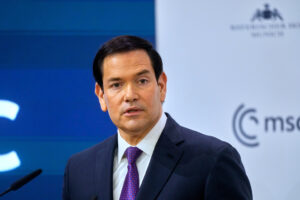Column | Mixed Messages: The EU’s Approach to Mass Migration
The European Union has long been hailed as a fierce protector of human rights, but when faced with a surge of asylum seekers from North Africa, its stance shifted. How does the EU tackle migration policy, and what leads it to deviate from decades of human rights commitments?

Migrants queued as they waited to be transferred to the mainland on the Sicilian island of Lampedusa. Image Credit: Yara Nardi/Reuters
“Either I will die, or I will go to Italy.” That was the mindset of Mbalo, a 20-year-old from Gambia and one of the few survivors of a shipwreck in the Mediterranean in 2015 that killed 800 people. Amidst a vessel teeming with African migrants, each having navigated through harrowing circumstances in their homelands – ranging from political oppression to civil conflict, only 28 individuals emerged as survivors on the perilous journey to Europe. This 2015 shipwreck is one among numerous heartbreaking stories of Mediterranean deaths in the past decade – nearly 27,000 migrants have drowned seeking asylum in Europe. Despite the ever-present dangers, for many, the choice is the same as Mbalo’s: flee to Europe or die trying. However, if the EU had its way, Mbalo might never have crossed the Mediterranean, let alone a boat on the North African coast.
In this essay, I will delve into the European Union’s new approach to mass migration and the intricate challenges it entails. In the forthcoming weeks, this column will further explore the ideas introduced in this article, emphasizing the legal hurdles facing Frontex, the EU agency responsible for managing external borders. We will also examine the relationship between the EU’s migration system and the surge of coups across West Africa, while also considering potential avenues for enhancing policies to protect the lives of asylum seekers.
The EU’s Changing Approach to Migration
The refugee crisis unraveling in the Mediterranean is reshaping the European Union’s human rights legacy. Historically, the European Union and its member states have stood at the forefront of the global human rights movement, playing a pivotal role in crafting foundational documents. The EU took the lead in initiating the creation of crucial human rights frameworks, with its member states being among the earliest to ratify key agreements such as the UN Convention on the Status of Refugees.
However, the current scenario paints a disconcerting picture, as these same states are now denying rights to refugees. This departure from their longstanding human rights commitments is worrisome and constitutes one of the largest challenges to the modern human rights system. It marks a paradoxical situation where the countries instrumental in creating standards for the treatment of refugees are now attempting to reverse these very principles.
Navigating Challenges in “Safe Third Countries”
In response to mass migration across the Mediterranean, the European Union has adopted a policy of externalizing its borders. This approach emphasizes “the prevention of irregular arrivals by outsourcing migration management and border controls to regions and countries outside the EU.”
This policy aims to “hinder [refugees]from exiting as well as entering,” a move that violates established human rights norms. Its initiation traces back to the 2015 refugee crisis, wherein 1.3 million individuals – primarily Syrian refugees, along with significant numbers from Afghanistan, Nigeria, Pakistan, Iraq, Eritrea, and the Balkans – sought asylum in Western Europe. This upswing in asylum seekers during 2015 marked the highest influx since the fall of the Berlin Wall in 1985. Various factors led to this increase, including the escalation of conflicts in the Middle East, ISIL’s territorial and military dominance in the region, and the decisions of Lebanon, Jordan, and Egypt to cease accepting Syrian asylum seekers. As the European Union grappled with the unprecedented volume of migration and a surge in anti-immigrant sentiment, particularly in Mediterranean-bordering states, it responded by forging agreements with “safe third countries.” These agreements entail processing asylum claims in third countries rather than within EU member states.
In recent years, the EU has entered into Memorandums of Understanding (MoU) with Turkey, Libya, and Tunisia. Under these MoUs, these safe third countries are granted “training as well as funding from the EU,” ostensibly aimed at managing so-called irregular migration flows. However, these agreements have come under scrutiny for providing support to corrupt governments with well-documented records of human rights abuses. Despite these concerns, the European Union remains steadfast, refusing to alter its approach.
For instance, in July of this year, the EU and Tunisia signed an MoU aimed at promptly implementing its migration component. This move is disturbing, given that Kaïs Saied, Tunisia’s increasingly anti-democratic leader, receives EU funding from this agreement despite his actions to dissolve the democratically elected government in his country. Tunisians, who fervently fought for democratic reforms during the Arab Spring in 2011, now witness the erosion of these hard-fought victories. This unsettling development unfolds while Europe’s most powerful democracies continue to support Tunisia’s now tyrannical president.
The European Commission is actively going against the advice of EU watchdogs, independent advisors tasked with monitoring the legality of EU policy. Before finalizing the EU deal with Tunisia, the EU ombudsman, an independent advisor, inquired about human rights assessments and implementation monitoring plans, only to be ignored. The EU’s priorities are clear, and this policy shift represents uncharted territory for the region, necessitating a closer analysis of its effects.

Tunisia is not an outlier, as the EU continues to sign deals with Libya despite their ongoing civil war and with Sudan despite their lack of a democratic government since the ousting of Omar al-Bashir in 2019. The commitment of these governments to EU standards appears inconsequential as long as they effectively impede migrants from crossing the Mediterranean.
The objective behind implementing externalizing border policies is to encourage refugees to seek asylum in the first safe country they enter, preventing their asylum claims from being processed by an EU member state. However, it’s worth noting that this rule contradicts the stance of the UN Refugee Agency, which asserts that the Refugee Convention or international law does not mandate such a requirement. Moreover, the feasibility of this approach is questionable, given that the countries receiving EU funding may not necessarily be safe.
Widespread instability across Africa is complicating the EU’s efforts to designate safe third countries for migrants. Ongoing civil wars in Sudan and Libya, along with the collapse of democratically elected governments in Tunisia and Niger, cast doubt on the EU’s classification of these nations as “safe.” The irony deepens as new agreements are forged amid blatantly unsafe conditions, prompting us to scrutinize the relevance of the “safe third countries” label across North Africa. The application of this label appears inconsistent, neglecting ample evidence of deteriorating conditions.
Unraveling Frontex and Its Issues
Since 2015, the European Agency for the Management of Operational Cooperation at the External Borders, more commonly referred to as Frontex, has seen a notable uptick in its influence, especially in its role of providing training to safe third countries. Established in 2004, Frontex holds a pivotal position in the EU’s defense against mass migration, orchestrating external border management in conjunction with the immigration agencies of individual member states.
Frontex’s prominence has surged in recent years, primarily due to a substantial increase in funding. Currently, it is the EU agency with the largest proportion of funding, with a projected budget of 5.6 billion euros between 2021 and 2027. This funding allowed Frontex to purchase and lease military equipment for borders and coastline patrols and fund the expansion of its ground force, marking the emergence of the first European law enforcement uniformed service. The funding allocated to Frontex has also facilitated the development of the EU’s externalized border system in collaboration with designated safe third countries.
One of Frontex’s first agreements in Africa was the establishment of the Africa-Frontex Intelligence Community (AFIC) in 2010. Initially focused on fostering information sharing among primarily West African states and Frontex to prevent irregular migration, AFIC has evolved beyond mere data exchange. It now encompasses cooperation on “‘harder’ security issues, such as terrorism (including al-Shabaab and Boko Haram) and organized crime.” The direct involvement of the EU’s migration agency in the internal affairs of African states raises concerns. It underscores the increasingly militant aspect of Frontex, a group originally tasked with peacefully monitoring EU borders. Furthermore, it reflects a form of European interventionism in Africa, a problem exemplified by recent coups in West Africa driven by discontent with leadership cooperating with former colonial powers.
While Frontex’s expanded operations with African states claim to address domestic security crises to prevent the root causes of migration, they also raise apprehensions about the heightened security orientation of Frontex’s practices. Although not a military entity, Frontex stands out among EU organizations by providing security assistance to numerous nations in the Global South, under the pretext of preventing mass migration. The militarization of migration policy has led to a rise in human rights abuses and has proven ineffective in curbing migration to the European continent, creating a lose-lose situation for the EU.
The Future of Externalized Border Governance
In 2023 alone, more than 2,000 migrants have tragically lost their lives attempting to cross the Mediterranean. These migrants find themselves just a few miles away from the shores of Lampedusa or the Canary Islands, well within EU territorial waters, only to meet a heartbreaking end by drowning. This grim narrative unfurls almost daily, yet the resolve of refugees remains steadfast: escape to Europe or face the risk of perishing in the attempt. The urgent shift needed now is not in the mindset of the refugees but in that of the European Union.

Cameron Roberts (she/her) is a Managing Editor and Columnist for the JPI online magazine. She is an undergraduate junior at NYU in the Global Liberal Studies program, concentrating on Politics, Rights, and Development. Her academic and research interests lie in issues related to migration policy in the Mediterranean region and conflict within the Middle East and North Africa. Outside of JPI, she volunteers with Commonpoint Queens and Serve the City. In her free time, Cameron enjoys spin classes and spending time with friends.





What an amazing article